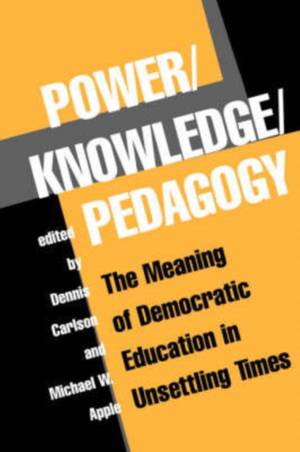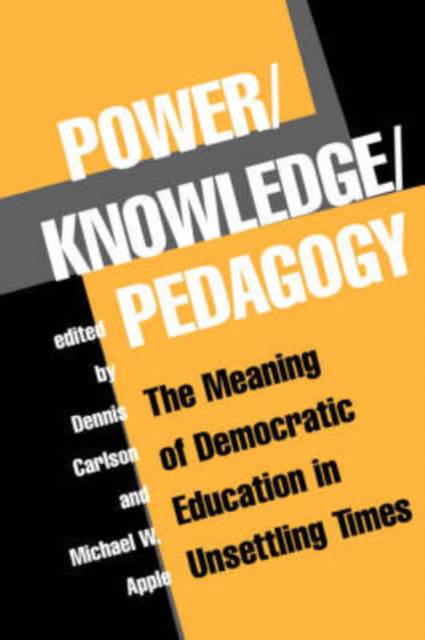
Je cadeautjes zeker op tijd in huis hebben voor de feestdagen? Kom langs in onze winkels en vind het perfecte geschenk!
- Afhalen na 1 uur in een winkel met voorraad
- Gratis thuislevering in België vanaf € 30
- Ruim aanbod met 7 miljoen producten
Je cadeautjes zeker op tijd in huis hebben voor de feestdagen? Kom langs in onze winkels en vind het perfecte geschenk!
- Afhalen na 1 uur in een winkel met voorraad
- Gratis thuislevering in België vanaf € 30
- Ruim aanbod met 7 miljoen producten
Zoeken
Power/Knowledge/Pedagogy
The Meaning of Democratic Education in Unsettling Times
Dennis Carlson
Paperback | Engels
€ 109,95
+ 219 punten
Uitvoering
Omschrijving
The essays in this volume explore the educational implications of unsettling shifts in contemporary culture associated with postmodernism. These shifts include the fragmentation of established power blocs, the emergence of a politics of identity, growing inequalities between the haves and the have-nots in a new global economy, and the rise in influence of popular culture in defining who we are. In the academy, postmodernism has been associated with the emergence of new theoretical perspectives that are unsettling the way we think about education. These shifts, the authors suggest, are deeply contradictory and may lead in divergent political directions?some of them quite dangerous. Power/Knowledge/Pedagogy examines these issues with regard to four broad domains of educational inquiry: state educational policy and curriculum reform, student identity formation, the curriculum as a text, and critical pedagogy. The book contributes to the dialogue on the forging of a new commonsense discourse on democratic educational renewal, attuned to the changing times in which we live.
Specificaties
Betrokkenen
- Auteur(s):
- Uitgeverij:
Inhoud
- Aantal bladzijden:
- 366
- Taal:
- Engels
Eigenschappen
- Productcode (EAN):
- 9780813391380
- Verschijningsdatum:
- 2/04/1999
- Uitvoering:
- Paperback
- Formaat:
- Trade paperback (VS)
- Afmetingen:
- 152 mm x 229 mm
- Gewicht:
- 489 g

Alleen bij Standaard Boekhandel
+ 219 punten op je klantenkaart van Standaard Boekhandel
Beoordelingen
We publiceren alleen reviews die voldoen aan de voorwaarden voor reviews. Bekijk onze voorwaarden voor reviews.









